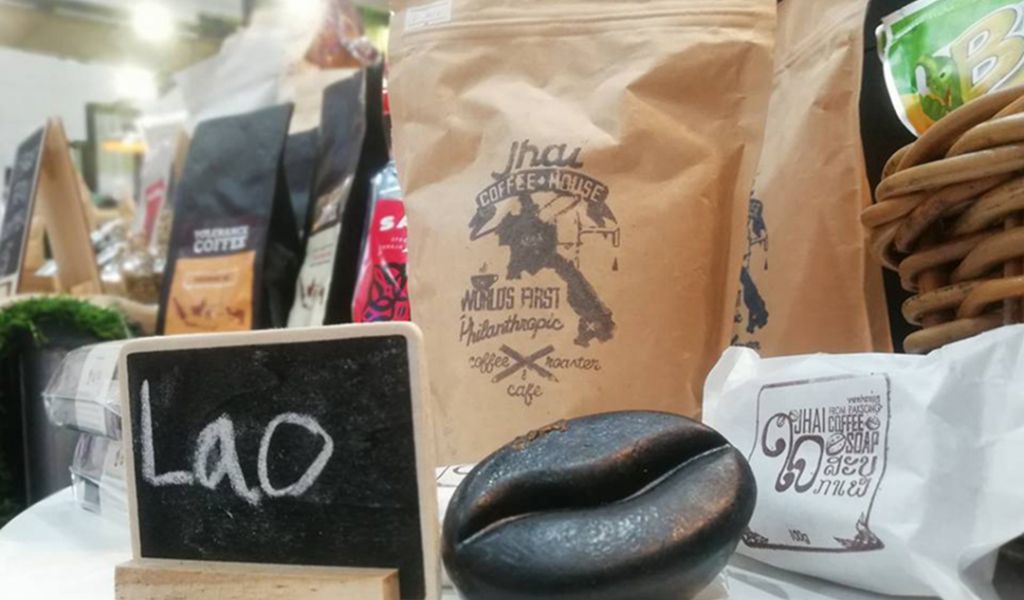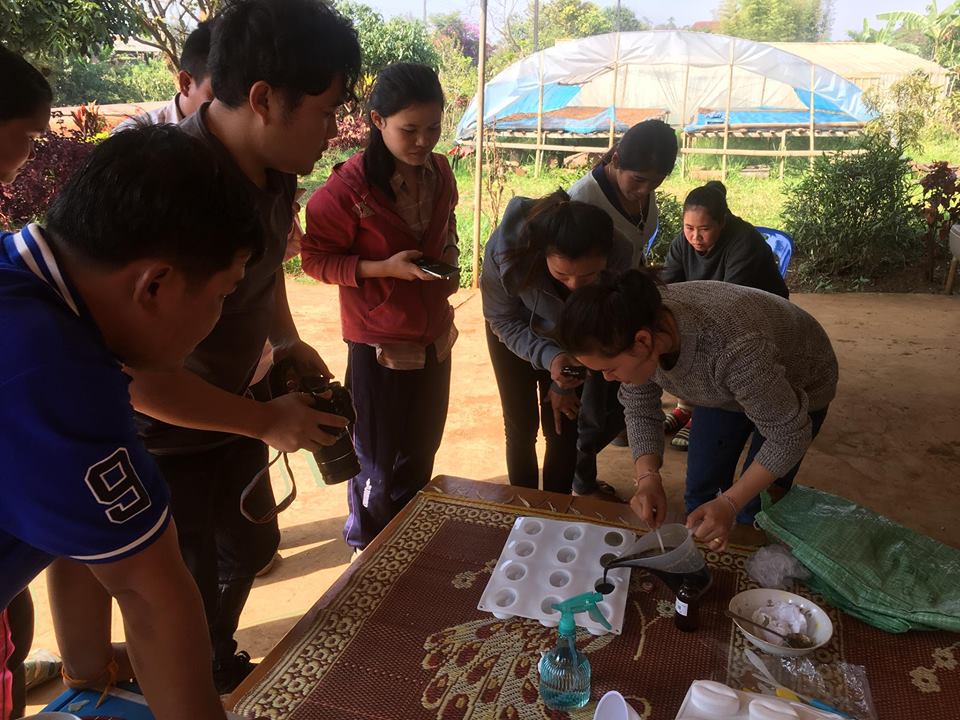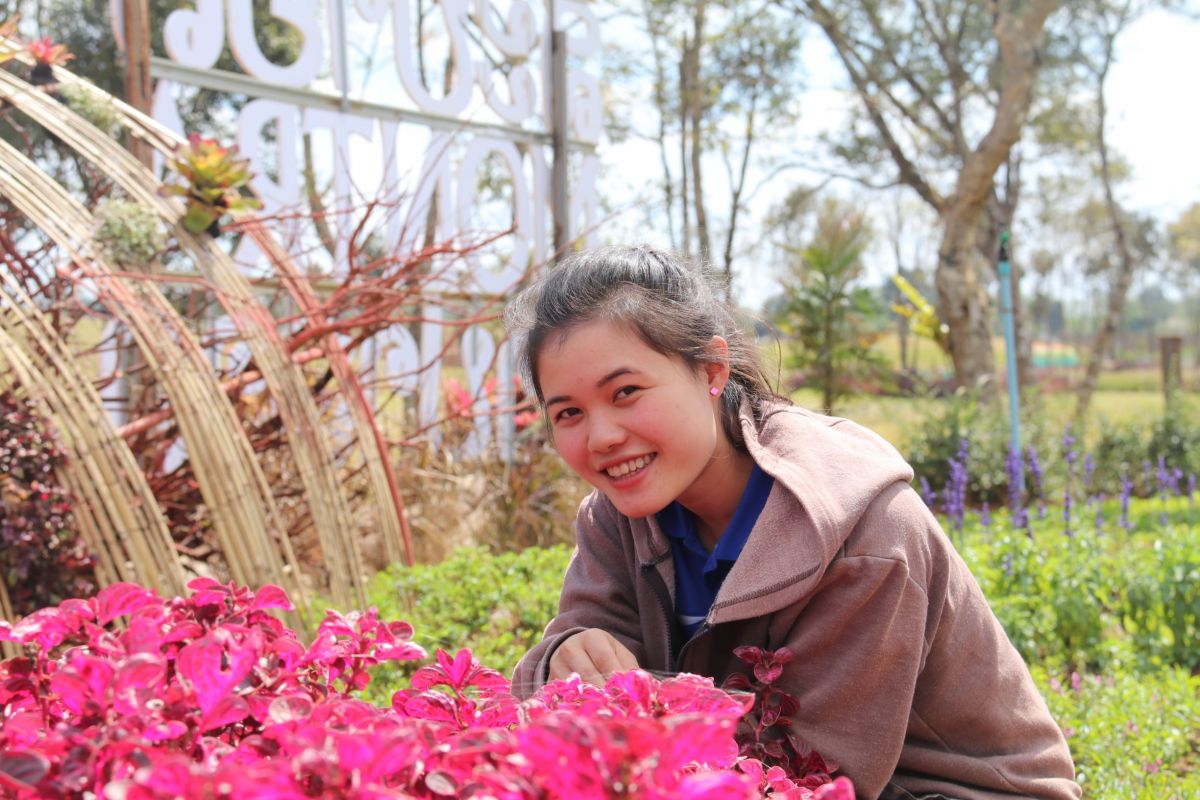Phonevilay’s Coffee Soap business is taking off after a slippery start

“Some people joined our group just long enough to learn how to make soap, and then they started producing and selling soap directly to our customers for a lower price without telling the rest of us! That really damaged our customers’ trust in us," recalls Ms. Phonevilay, looking slightly frustrated about the recent events.
So what happened, how did Ms. Phonevilay’s coffee soap business get to a point where its own members began to undermine it? It all started with a trip to the Philippines. The Lao Farmer Network had selected Ms. Phonevilay as their youth representative to participate in the 7th ASEAN Cooperative Business Forum in Manila in January 2018. Ms. Phonevilay’s reason for attending the conference was to get ideas of potential income-generating products that her youth group could start making. Phonevilay’s interests got piqued when she saw a Thai farmer group showcasing their ‘salt soap’ product. “A soap business seemed like a good fit for a youth group like ours because it has low startup costs. As youth we don’t have a lot of money to pool together as startup capital,” Ms. Phonevilay explains.
“After that conference, a bunch of us got the chance to attend Lao Farmer Network’s training on soap making. And after we had the basics of soap making down, we started to adapt what we had learned.” She continues, “My sister works at the Jhai coffee shop and every day they are left with used coffee grounds. In the past she had made skin scrub using the grounds and that made me think, why not try using coffee grounds in soap?”

“To get started, all we needed were the raw materials and molds. The coffee grounds we got from my sister’s shop, but the fragrance oil, glycerin, and soap molds we bought from Thailand because they were harder to find here in Laos,” Ms. Phonevilay says. She adds, “At first, we made some soap bars to test the concept and to see whether people would be interested in our product. Our production costs, not including branding and packaging, were about 6,000 kip per bar. After a while, we developed packaging and started to advertise the product more widely. That increased our production cost to 9,000 kip.”
It was around this time that there started to be infighting within the group because some of the members didn’t want invest their own money in the business. “But in a group like this we need to share both the costs and the benefits” Ms. Phonevilay says. She continues, “We didn’t communicate well within the group and the situation got inflamed and led to some of the members producing and selling soap directly to our customers for a lower price without telling the rest of us.”
The group had to explain the confusing situation to their customers, but more importantly they focused on improving their product. “We are working on new packaging that describes the benefits and highlights the quality of our product. Our soaps are good for health and they are environmentally friendly because we don’t use any dangerous chemicals or use plastic in the packaging. We’ve also developed new products such as ‘coffee turmeric soap,’ ‘coffee yogurt soap,’ and a ’coffee scrub powder.’ And based on our customers’ feedback we also plan to make smaller and cheaper soap bars because we now only have one size,” Ms Phonevilay explains.
Currently, the group can produce 100 bars per day. They sell the bars for 15,000 kip each, while their wholesale price is 13,000 kip in a pack of 10 bars. The group sells the soap at the Jhai coffee shop in Paksong, online via Facebook, and at the Pakse market. Some retailers also go to buy the soap directly from Phonevilay’s house. Some buyers distribute the soap to some shops in Vientiane. The group does not sell the product in other provinces yet because shipping fees are expensive. Figuring out the best way to ship the soap to other provinces affordably and finding ways to increase production are the group’s biggest challenges at the moment. “However, these are positive challenges; the need to produce more is a sign that our business is going well. In fact, we were just contacted by a hotel manager who wanted to buy our product for all their rooms!” Ms. Phonevilay says excitedly.
Contact Jhai Coffee Soap: toungting.selaphet and 020 9871 4788
Profile: Ms. Phonevilay Selaphet
Name: Ms. Phonevilay Selaphet
Age: 23 years
Education: Graduated from Pakse Teacher Training College
Current job: The head of the youth group’s soap making business
What is she known for:
Starting a coffee soap business with her youth group. Her group developed the product from scrup and have since then expanded their product line and sell their products at local markets, online, and try to contact for wholesale to hotels in Pakse district.
What's the most important lesson you have learned since starting your business?
It’s important to try to learn from others, see what others are doing and try to adapt ideas and lessons from them to your own business. Also, as the leader of our group, I’ve had to learn about responsibility and the importance of shared vision within the group. Effective communication is crucial in order to avoid conflict within the group, but equally important for communicating with customers face to face and online.
What would she like to say to youth who are contemplating starting their own business?
I’d ask, “Do you have a real passion and love for business?” It’s not always easy and you need to love doing business to keep at it through the difficult times. As for me, I started to help my father at the Jhai coffee shop while still in school. I used to help him after school and I quickly realized that business is in my blood. After graduating, I had more time to help my father at the coffee shop and with online sales, and my desire to do business just got stronger.
What are your hopes for the future?
I hope to start another business! Recently, I’ve been helping my father with coffee export documents at the Jhai coffee cooperative. This has given me useful experience in shipping products overseas. I’d like to use that knowledge with another product. For example, there are cash crops like cabbage and chayote being grown here in Paksong that sell for a low price. I want to start a trading business selling these cash crops, and my brother is helping me to find markets in Thailand and Vietnam. But I would not have ever even dreamed of starting such a business if it wasn’t for the experience and lessons that I’ve learned while working with the Jhai coffee shop, Lao Farmer Network, and my coffee soap group. So my message to others is if you like, love business, do it, don’t waste your time.
